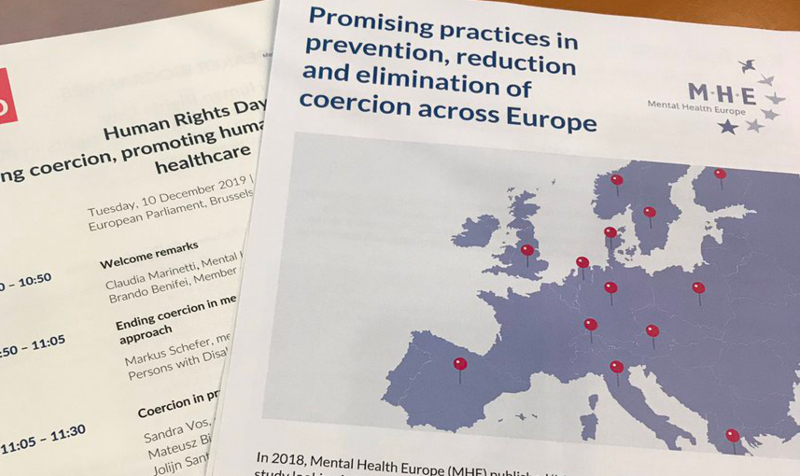New MHE report on promising practices to end coercion in mental health services

MHE just released its ‘Promising practices in prevention, reduction and elimination of coercion across Europe’ report. Following on the publication of MHE’s Mapping and Understand Exclusion report, MHE has collected information with the help of its members to identify promising approaches used to end/reduce the use of coercion in mental health services. Each practice introduced in the report looks at what was done to reduce coercion, and what were the successes and challenges of implementation.
BACKGROUND
Coercion or coercive measures refer to involuntary, forced or non-consensual practices used in mental health services against people with mental health problems
As highlighted in our Mapping Exclusion report, the use of coercion in psychiatry is still widely used across Europe, with increasing figures in England, Scotland, Ireland, Belgium, France and the Netherlands.
To be human rights compliant and in line with the UN Convention on the Rights of Persons with Disabilities (UN CRPD), coercion must be eliminated across all mental health services. However, the gap between theory and practices is considerable, and challenges remain: to date, there are no mental health systems that have yet switched to fully consensual practices.
This report offers an overview of successful and promising practices to prevent, reduce and eliminate coercion in mental health care, including restraint and seclusion. Its aim is to highlight positive examples across Europe and beyond.
The initiatives highlighted in the report are either hospital-based, community-based or include more general practices (such as crisis helplines in Austria). Those practices show that there is no one-size-fits-all approach to prevent, reduce and eliminate coercion but point to approaches which are critical for success, such as:
- devoting more time and improving communication with users,
- involving staff and peers in initiatives,
- training staff members,
- monitoring and collecting data on the use of coercion
This report shows that it is not about changing individual practices but about implementing a new culture in mental health care. As the report suggests, a combination of both grass-root work and overarching strategies seems the best way forward to end coercion in practice. Only the elimination of coercion will ensure systemic change leading to a human-rights based mental health system, in compliance with the UN CRPD.
Stay connected
Get our latest news, personal stories, research articles, and job opportunities.